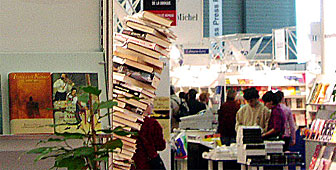Book fair celebrates power of word in defending human rights

The issue of human rights is taking centre stage at this year's Geneva Book Fair, which is marking the 40th birthday of Amnesty International. The occasion celebrates the role of the written word in the fight against torture and other human rights abuses.
The organisers of the Book Fair invited Amnesty, whose symbol is a candle, to be one of its two guests of honour. But rather than blowing out candles to mark the occasion, Amnesty will be lighting many more.
“We don’t see it as a reason to celebrate,” says Anna Wegelin, a spokeswoman for Amnesty’s Swiss section. She says the organisation will be using the anniversary to publicise its campaign against torture. “We want to highlight that, 40 years on, this problem still exists.”
It is often said that Amnesty breaks prison bars with pens and, given the role that journalists and novelists have played in fighting for human rights, it is appropriate that Amnesty should have been given such a prominent place at the book fair.
Indeed, it is also significant that the other guest of honour at this year’s fair is Portugal. It was the jailing of two students by the right-wing Salazar government, which prompted the British lawyer, Peter Benenson, to launch Amnesty in May 1961.
“Writers have always played a part in making public what is going on in secret,” Wegelin says.
Amnesty’s two-storey stand, the first that visitors encounter when entering the fair, is decorated in yellow and black, the colours of the torture campaign, and Amnesty is unashamedly using the fair to get as many people personally involved as possible.
“Of course, we are trying to recruit new members, because you can’t do effective human rights work with adequate funds,” Wegelin told swissinfo.
Visitors to Amnesty’s stand at the fair can use a fax station to send a message to governments that continue to practise torture, or they can have their picture taken and pasted on a large mural of a torture victim.
Amnesty has organised a number of public debates and offered victims of torture from countries such as Turkey, Tunisia, Algeria, Colombia, Georgia and Togo a platform to speak to the public about their experiences.
“This is where human rights really touches people. This is what our work is all about,” Wegelin says.
by Roy Probert

In compliance with the JTI standards
More: SWI swissinfo.ch certified by the Journalism Trust Initiative
You can find an overview of ongoing debates with our journalists here. Please join us!
If you want to start a conversation about a topic raised in this article or want to report factual errors, email us at english@swissinfo.ch.